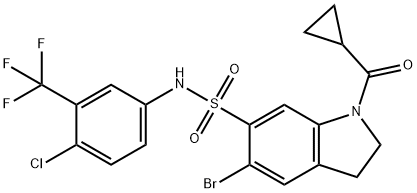All AbMole products are for research use only, cannot be used for human consumption.

Indophagolin is a potent, indoline-containing autophagy inhibitor (IC50=140 nM). Indophagolin antagonizes the purinergic receptor P2X4 as well as P2X1 and P2X3 with IC50s of 2.71, 2.40 and 3.49 μM, respectively. Indophagolin also antagonizes the Gq-protein-coupled P2Y4, P2Y6, and P2Y11 receptors (IC50s =3.4~15.4 μM). Indophagolin has a strong antagonistic effect on serotonin receptor 5-HT6 (IC50=1.0 μM) and a moderate effect on receptors 5-HT1B, 5-HT2B, 5-HT4e, and 5-HT7.
| Molecular Weight | 523.75 |
| Formula | C19H15BrClF3N2O3S |
| CAS Number | 1207660-00-1 |
| Solubility (25°C) | DMSO ≥ 100 mg/mL |
| Storage | 2-8°C, protect from light, sealed |
| Related Autophagy Products |
|---|
| NEO214
NEO214 is an autophagy inhibitor and a covalent conjugate of the PDE4 inhibitor Rolipram and perillyl alcohol. NEO214 has anti-cancer activity and blood-brain barrier (BBB) permeability. NEO214 prevents autophagy-lysosome fusion, thereby blocking autophagic flux and triggering glioma cell death. |
| Ammonium chloride-15N
Ammonium chloride-15N is the 15N labeled Ammonium chloride. Ammonium chloride is an autophagy inhibitor. Ammonium chloride is also a lysosome inhibitor. |
| Vacuolin-1
Vacuolin-1 is a cell-permeable inhibitor of Ca2+ dependent fusion of lysosomes to the cell membrane. Vacuolin-1 blocks the Ca2+-dependent exocytosis of lysosomes and prevents the release of lysosomal content without affecting the process of resealing. vacuolin‐1 is a potent and selective PIKfyve inhibitor and inhibits late‐stage autophagy by impairing lysosomal maturation. |
| CA77.1
CA77.1 is a potent, brain-penetrant and orally active chaperone-mediated autophagy (CMA) activator with favorable pharmacokinetics. |
| KAN0438757
KAN0438757 is a potent and selective inhibitor of the metabolic kinase PFKFB3 with an IC50 of 0.19 μM. |
All AbMole products are for research use only, cannot be used for human consumption or veterinary use. We do not provide products or services to individuals. Please comply with the intended use and do not use AbMole products for any other purpose.


Products are for research use only. Not for human use. We do not sell to patients.
© Copyright 2010-2024 AbMole BioScience. All Rights Reserved.
